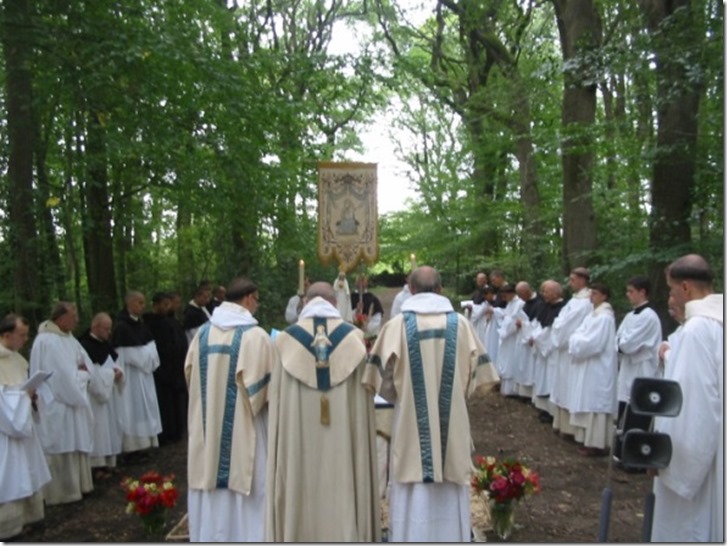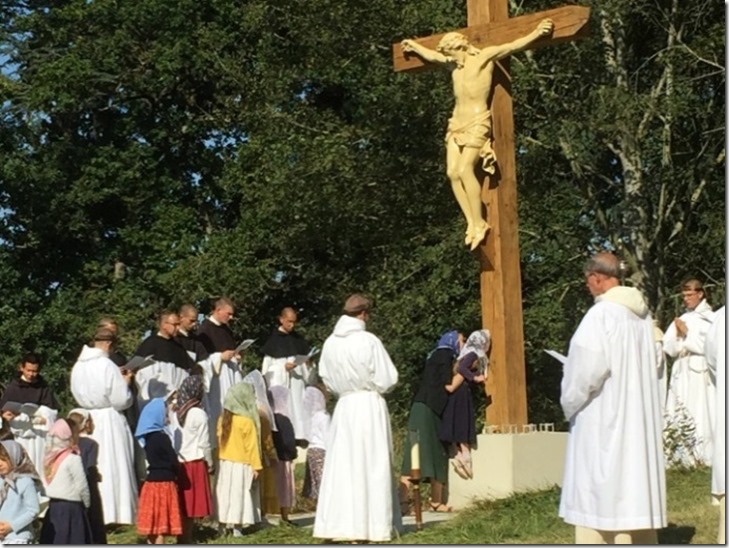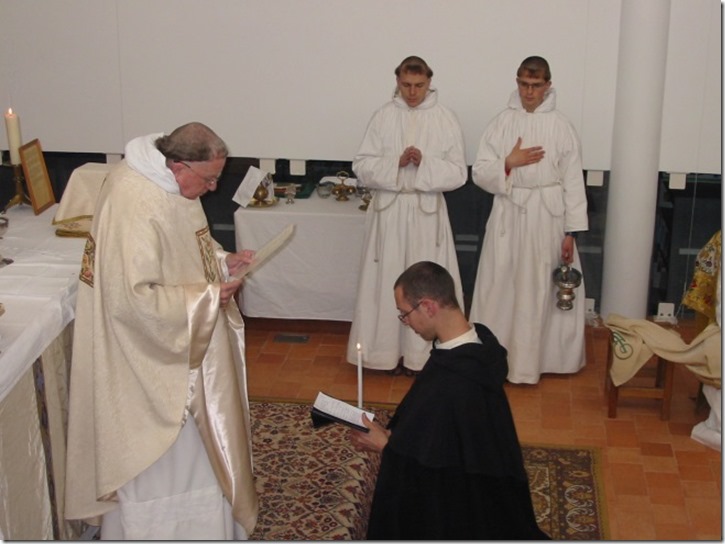Devotion to the Holy Face and the Golden Arrow
​ Sister Marie de Saint-Pierre (1816-1848)
from Le Sel de la terre 110, Autumn 2019
1. A Life Hidden in God
Perrine ELUERE, who was to become Sister Marie de Saint-Pierre in the Carmelite Order, was born on October 4, 1816 in Rennes (French Britanny). Born into a family of twelve children, she lost her mother at the age of twelve and asked the Blessed Virgin to be her mother.
Deciding to become a nun, she had to wait several years before realizing her vocation and invoked Saint Martin of Tours for this intention. On November 11, 1839, her feast day, she left Rennes for the Carmel of Tours.
There she was favored with revelations from Christ, on the gravity of blasphemy and desecration of Sundays and the need to make reparation for so many crimes that directly offend God. Jesus taught her a prayer of reparation – The Golden Arrow – and also asked for the establishment of a brotherhood of reparation. He entrusted France to her prayers.
Sister Marie de Saint-Pierre lived in great devotion to the Child Jesus and the Holy Face. Very humble, helpful, and patient, she accepted the most modest tasks with obedience, following the example of the Child Jesus.
Put to the test by her superiors, to whom she had opened up about the revelations she had received, she always showed obedience and humility. Stricken with pulmonary tuberculosis, she died in the odor of sanctity on July 8, 1848, in her thirty-third year, after a painful agony.
Six months after her death, in January 1849, a miracle in Rome popularized devotion to the Holy Face throughout Christendom and encouraged the saintly man from Tours, Mr. Dupont, to exhibit the image in his salon, which quickly became a very popular oratory because of the miracles that multiplied there.
But even before that, Mr. Dupont, who knew Sister Marie de Saint-Pierre personally, advised everyone to pray at her tomb to ask for graces. Saint Thérèse of the Child Jesus, in turn, had a special devotion to the Carmelite nun of Tours, from whom she drew inspiration for her childlike way.
2. Making Reparation for the Blasphemies and Offenses Against God
The Golden Arrow
On August 26, 1843, during the evening prayer, Sister Marie de Saint-Pierre received the inspiration to spread a devotion named The Golden Arrow. The holy man from Tours, Mr. Dupont, who learned about it later, saw it as a response from Heaven, for he had prepared the feast of St. Louis (August 25) with a novena asking the holy king for his intercession and help in the fight against blasphemy in France. Sister Marie de Saint-Pierre reported to her Mother Superior in these words:
“Our Lord opened His Heart to me, gathered the powers of my soul in it, and addressed these words to me: ‘My Name is blasphemed everywhere; even children blaspheme!’ “And He made me hear how this awful sin hurt His divine Heart more painfully than all the others; by blasphemy, the sinner curses Him to his face, attacks Him openly, annihilates the Redemption, and pronounces himself his condemnation and his judgment. Blasphemy is a poisoned arrow, which continually wounds His Heart: He told me that He wanted to give me a golden arrow to wound Him delightfully, and to heal the wounds of malice that sinners make Him.â€
“Here is the formula of praise that Our Lord, in spite of my great unworthiness, dictated to me for the reparation of blasphemies against his holy Name. He gave it to me like a golden arrow, assuring me that every time I say it, I will wound his Heart with a wound of love:
Golden Arrow:
May the most holy, most sacred, most adorable, most incomprehensible, and ineffable Name of God be forever praised, blessed, loved, adored, and glorified forever in Heaven, on earth, and under the earth, by all the creatures of God, and by the Sacred Heart of Our Lord Jesus Christ in the Most holy Sacrament of the Altar. So be it.
“Our Lord, having given me this golden arrow, added: ‘Pay attention to this favor, for I will ask you to give an account.’â€
“At that moment it seemed to me that streams of grace for the conversion of sinners were coming out of the Sacred Heart of Jesus, wounded by this golden arrow.â€
Jesus’ Great Desire: to Glorify the Name of the Father
A month later (September 29, feast of St. Michael), the sister communicated to her Mother Superior:
“Our Lord inspired me to join to the praise of the Golden Arrow some prayers to make reparation, by twenty-four adorations, the blasphemies professed at each hour of the day, and He was kind enough to let me know that He accepted this exercise. This divine Savior made me share in the desire He feels to see the Name of His Father glorified; He told me to apply myself to praising and blessing this adorable Name, in imitation of the angels who sing in heaven perpetually: Sanctus, Sanctus, Sanctus; and thus I will fulfill the order He gave me to honor His Heart and that of His holy Mother, for they are both wounded by blasphemy. He also made me understand that this would not prevent me from honoring Him in His mysteries, as I am accustomed to do, because in all the mysteries of His life His Heart has suffered for the sin of blasphemy.â€
Gravity of the Desecration of Sundays
On November 24, the sister relayed these words of Our Lord:
“The earth is covered with crimes! The breaking of the first three commandments of God has angered My Father; the blasphemy of the Holy Name of God and the profanation of the Holy Day of Sunday have added to the measure of iniquity; these sins have reached the throne of God and provoked His wrath, which will be poured out if His Justice is not appeased. I desire, but with a strong desire, that a well-approved and well-organized association be formed to honor my Father’s name.â€
[…]
3. The Holy Face of Our Lord
Offering Jesus to His Father
On December 25, 1843, Sister Marie de Saint-Pierre made an act of perfect donation to the Most Holy Child Jesus according to the extent of His will for the accomplishment of His designs to the glory of the Holy Name of God. From this date on, Jesus asked her to join devotion to His holy Face to acts of reparation against blasphemies:
“He said to me, ‘Just as in a kingdom you can get everything you want with a silver coin marked with the effigy of the prince, so with the precious coin of My holy Humanity, which is my adorable Face, you will get everything you want in the kingdom of heaven’â€.
“It seems to me that we should only pray and present ourselves before the eternal Father with some merit of His Son in our hands, in order to offer it to Him and thus oblige Him to fulfill the admirable promise of our Lord: ‘Amen, amen, I say to you: if you ask the Father anything in my name, He will give it you.’ (Jn. 16:23). If we have no virtues to offer to God, let us offer Him all those of Jesus our Savior, who sanctified Himself for us. Let us offer His gentleness, humility, patience, obedience, poverty, fasts, vigils, and zeal for the glory of His Father and the salvation of souls! Let us also offer His divine and effective prayers; He prayed during his mortal life; the Gospel says that He withdrew at night to pray; He prays in Heaven; He shows His wounds to His Father for us; finally He prays in the most holy Sacrament of the altar.â€
“O what an ineffable mystery! A Savior God praying for His creatures, and prayed to by these same creatures!â€
“Let us unite our prayers with those of the incarnate Word, and they will be answered; let us offer to the eternal Father the sacred Heart of Jesus, His adorable Face, and His divine wounds; let us offer His tears, His blood and His sweat; let us offer His travels, works, words, and silence, all that He suffered in each of His mysteries; finally, let us always have our eyes fixed on the Gift of God; let us search in this treasure unknown to the world; let us, if we can, enumerate all the goods we possess in Him, and we will soon be rich and enrich poor sinners: For we can offer the humility of Jesus for the conversion of the proud, His poverty for the avaricious, His mortification for the sensual, His zeal to glorify His Father for the blasphemers, finally all the accusations He suffered from the Jews saying He was violating the Sabbath law, for the conversion of the true violators of the holy day of Sunday.â€
“O gift of God that I have ignored for too long, You will be my only treasure from now on; I discover new riches in Thou every day.â€
Importance of Reparation
On February 2, 1844, Jesus expressed again the great concerns of His Heart, the honor of His divine Father and that of His holy spouse:
“O you who are My friends and My faithful children, see if there is a pain similar to Mine; My divine Father and My Spouse, the holy Church, the object of the delights of My Heart, are despised, outraged by My enemies. Will no one arise to console Me, by defending them against those who attack them? I can no longer remain in the midst of this ungrateful people; see the torrents of tears that flow from My eyes. Will I find no one to wipe them away, making reparation to the glory of My Father and asking for the conversion of the guilty?â€
To Intercede for Sinners
“Another day, He showed me the multitude of those who continually fall into hell, inviting me in the most touching way to help these poor sinners, and making me understand the strict obligation of the Christian soul towards these blind wretches who are precipitating themselves into the eternal abyss and to whom His mercy would open their eyes, if charitable hearts interceded for them. He told me that if He would ask the rich for an account of the temporal good He had entrusted to them to help the needy, how much more would He ask a Carmelite, a religious soul, rich with all the goods of the heavenly Spouse, for a rigorous account of the use she had made of them to help unfortunate sinners? Then this amiable Savior, opening to me His immense treasures composed of the infinite merits of His life and passion, added: –‘My daughter, I give you my Face and My Heart, I give you My Blood, I give you My wounds: draw and pour! Draw and pour! Buy without money, My Blood is the price of souls. Oh, what a sorrow for My Heart to see that remedies that cost Me so much are despised! Ask My Father for as many souls as I shed drops of blood in My Passion.’â€
Gravity of Blasphemy
“He made me understand that men are incapable of understanding the insult done to God by this sin of blasphemy; blasphemies pierce His heart and make Him a second Lazarus covered with wounds. He invited me to imitate the dogs who comforted poor Lazarus by coming to lick his wounds; I would do Him a great service by employing my tongue to glorify every day the most holy Name of God despised and blasphemed by sinners, without considering whether this exercise gave me interior consolations; it would be enough for me to think that I was healing His divine wounds and causing Him great satisfaction.â€
The Holy Face of Christ Offended by Blasphemies
“I understood that, as the Sacred Heart of Jesus is the sensitive object offered to our adoration to represent His immense love in the most holy Sacrament of the altar, so, in the work of reparation, the Face of Our Lord is the sensitive object offered to the adoration of the associates to repair the outrages of the blasphemers who attack the Divinity of which it is the figure, mirror, and expression. By the virtue of this adorable Face, presented to the eternal Father, we can appease His anger and obtain the conversion of the impious and blasphemers.â€
“Our Lord made me see that the Church, His Spouse, is His mystical body, and that religion was the face of this body; then He showed me this face in the face of the enemies of His Name, and I saw that the blasphemers and the sectarians were renewing on the holy Face of Our Lord all the opprobrium of His Passion. I saw, thanks to this divine light, that the impious, by uttering evil words and blaspheming the holy Name of God, were spitting on the Face of the Savior and covering it with mud; that all the blows given by the sectarians to the holy Church, to religion, were the renewal of the many blows that the Face of Our Lord received, and that these unfortunate people were making this august Face sweat by striving to annihilate its works.â€
“Our Lord showed me, with the help of a simple and just comparison, that the impious by their blasphemies attacked His adorable Face, and that the faithful glorified it by the homage of praise rendered to His Name and to His person.â€
“Merit is in persons, but the glory that accompanies them is in their name; it bursts forth when it is pronounced; the merit or demerit of a person passes into his name. The most holy Name of God expresses the divinity, and contains in it all the perfections of the Creator; it follows from this that the blasphemers of this sacred Name attack God himself. Now let us remember these words of Jesus: “the Father is in me and I in the Father.†(Jn. 10:38). Jesus made Himself passible by the Incarnation; and He suffered, in His adorable Face, the outrages done by the blasphemers to the Name of God, His Father.â€
“Our Lord has shown me that there is something mysterious about the face of a despised man of honor; yes, I see that his name and his face have a special connection. Behold a man distinguished by his name and merits, in the presence of his enemies; they do not lay hands on him, but they overwhelm him with insults, they add bitter derision to his name, instead of the titles which are due to him. Notice then what happens to the face of this insulted man; would you not say that all the outrageous words that come out of the mouths of his enemies come to rest on his face and cause him to suffer a real torment? We see this face covered with redness, shame, and confusion; the opprobrium and ignominy it suffers are more cruel to bear than real torments in the other parts of its body. Well, here is a weak portrait of the Face of Our Lord outraged by the blasphemies of the impious! Let us represent this same man in the presence of his friends, who, having learned of the insults he has received, hasten to console him, to treat him according to his dignity, pay homage to the greatness of his name by calling him by all his titles of honor; do you not then see the face of this man feel the sweetness of these praises Glory rests on his forehead and, shining on his face, makes it all shiny: joy shines in his eyes, a smile is on his lips; in a word, his faithful friends have healed the bitter pain of this face outraged by his enemies, glory has passed the reproach. This is what the friends of Jesus do through the work of reparation; the glory they give to His Name rests on this august forehead, and rejoices His most holy Face, in a very special way, in the most holy Sacrament of the altar.â€
Healing the Blasphemers
• 3 November 1845:
“According to the care you will take to repair My portrait, which was disfigured by blasphemers, I will take care to repair yours, which was disfigured by sin. I will reprint My image on it, and I will make it as beautiful as it was when it came out of the font of baptism. Abandon yourself therefore into My hands and be willing to suffer all the operations necessary for the restoration of this image. Do not be troubled if you experience sadness and darkness, for you know that in an image, the dark colors serve to bring out those that are more vivid. Men have the art of restoring bodies; but only I can be called the restorer of souls, and who restores them to the image of God. I have made known to you this work of reparation, I have shown you its excellence, and now I promise you the reward.â€
“Oh! If you could see the beauty of my Face! Your eyes are still too weak!â€
• 5 January 1846:
“Our Lord made me aware that Lucifer willingly left to other demons the care of leading other flocks of sinners, such as for example: the impure, the drunkards, the greedy; but the blasphemers form his favorite flock. He made it known to me that this work of reparation embraces not only the reparation of blasphemy proper, but also that of all other blasphemies uttered against religion and the Church; however, it applies especially to blasphemies of the holy name of God.
To Draw Tirelessly From the Gold Mine
“Our Lord […] again gave me the order to pray for France, telling me […] that I should draw on His divine wounds for His sheep; finally, that He was giving Himself to me like a gold mine, to pay to His divine Father the debts which our country owes to His justice, allowing me to take for this the great treasures of His Heart. Then Our Lord made me understand that I must be careful not to act like the lazy servant of the Gospel who did not use his talent: He will ask me for an account one day, and it is very easy for me to take from this gold mine that He himself dug by his works and sufferings. I believe that He very much desires to find someone who will oblige Him, through prayer, to show mercy to France.â€
Intercede for France
-
23 January, 1846:
‘The face of France has become hideous in the eyes of My Father, provoking His justice; offer Him therefore the Face of His Son, in whom He is pleased, in order to draw mercy on this France; otherwise, it will be punished.’
-
November 22:
This is what the divine Master told me: ‘My daughter, I take you today as My bursar, and I place My holy Face in your hands again, so that you may offer it unceasingly to My Father for the salvation of France. Make use of this divine talent; you have in it enough to do all the business of My house; you will obtain, through this holy Face, the salvation of many sinners; with this offering, nothing will be refused you. If you only knew how pleasing the sight of my Face is to My Father!’
Changing the Wine of Justice Into the Wine of Mercy
[…] I saw other punishments prepared to satisfy this justice. When I saw this, I said to Our Lord, “Sweet Jesus, if only I could drink the rest of this cup, so that my brothers might be spared!â€
“He answered me that He accepted my good will, but that I was not capable of emptying this cup, and that only He could drink it. The Savior, seeing my pain, beckoned me to enter His divine Heart; in His excessive mercy, He gave it to me as a vessel worthy of being presented to the eternal Father to receive this wine of His wrath, making me understand that, passing through this channel, it would be changed for us into the wine of mercy. But He does not want to entirely infringe the rights of justice; if I may express myself in this way, He wants to make a covenant between His justice and His mercy, and for this purpose He asks for the establishment of the work of Reparation to the glory of His Name. Yes, He will disarm the anger of God, His Father, if He offers Him a work of reparation for us! Is it not the least we can do, O sweet Jesus, to make reparation by our prayers, by our groans and by our adoration, for the enormous sins of which we are guilty towards the majesty of God? This, Mother, is the prayer that Our Lord put into my mouth, and which I want to repeat unceasingly: ‘Eternal Father, look upon the divine Heart of Jesus which I offer to you to receive the wine of your justice, so that it may be changed for us into the wine of mercy’. He made me understand that, each time I made this offering, I would obtain a drop of this wine of divine anger, which, falling, as I said above, into the vessel of the sacred Heart of Jesus, would change into the liquor of mercy.
Waging War on the Communists
In 1847, the League of Communists was founded in London. Two of its members, Marx and Engels, received the mission to write the doctrinal manifesto that appeared in February 1848 under the title Manifesto of the Communist Party. On March 14, 1847, Sister Marie de Saint-Pierre wrote to her superior:
“Our Lord today, after Holy Communion, made me understand that the plagues we have been struck with were only the forerunners of those which His justice is preparing for us if His anger is not appeased, and He showed me the sins of blasphemy and the profanations of Sunday under the emblem of two pumps, with which the men who are guilty of these crimes draw the waters of His wrath over France and expose themselves to being submerged by them, if this work of reparation which He gives her in his mercy as a means of salvation is not established. Then He told me that the sectarians called Communists had only made one excursion: ‘Oh’! He added, –‘if you knew their secret and diabolical machinations, and their anti-Christian principles! They are only waiting for a favorable day to set fire to France. Ask, therefore, for the work of Reparation to whom it belongs, in order to obtain mercy.’â€
• 29 March 1847:
Our Lord has entrusted me with a new mission which I would be afraid of if I were anything; but as I am nothing but a weak instrument in His powerful hand, I am perfectly at peace.
He commanded me to make war on the communists, whom He told me were the enemies of the Church and of His Christ, making me understand that these lion cubs were, for the most part, born in the Church whose cruel enemies they now declared themselves to be. Then He added: –‘I have made it known to you that I hold you in My hands like an arrow. Now I want to shoot this arrow at My enemies. I give you the weapons of My Passion to fight them: My cross, whose enemies they are, and the other instruments of My torture. Go to them with the simplicity of a child and the courage of a valiant soldier. Receive, for this mission, the blessing of the Father, the Son and the Holy Spirit’. Then I prayed to the Blessed Virgin to be the custodian of these divine weapons, given to me by her dearest Son, who is compared to the Tower of David, from which hang a thousand shields. Our Lord gave me, on this subject, several other lights which it would not be easy for me to relate. “Lord,†I said, “train my hands for battle, and teach me to use your instruments.â€
He said to me: ‘The weapons of My enemies give death, but Mine give life.’
How to Fight the Enemies of God
This is the prayer I often recite for this purpose: –Eternal Father, I offer you, against the camp of your enemies, the cross of Our Lord Jesus Christ and all the instruments of His holy Passion, that You may put division between them; for, as Your beloved Son has said, every kingdom divided against itself will be destroyed [Mt. 12:25].
[…] Jesus gives me grace to draw my weapons; today, after Holy Communion, He encouraged me to fight, and He promised to give me a cross of honor, which, He told me, would open heaven for me, if I were faithful […]. But, Reverend Mother, after having fought the enemies of God with all my strength during these three days of feasting, I now feel almost contrition. I explain myself: it is because I fear having made imprecations against them.
I know that the holy King David does the same in his psalms (108, for example); but I do not know if I am allowed to do so. Finally, I have said everything that Our Lord, it seems to me, inspired me to say; if it is wrong, and I am mistaken, I will not do it again.
I will tell you that I begin by placing my soul in the hands of Our Lord; then I beg him to bend His bow and shoot His arrows at His enemies; then I fight them first by His cross and by the instruments of His Passion, as He taught me; then by the virtue of the most holy Name of God. And this is my concern for the imprecations, for if it is wrong, I have repeated these words a hundred times; but I had no intention of wishing harm to these criminal people; I am only angry at their malice and their passions; I only want to kill the old man in them. So this is what I say:
Let God arise, let His enemies be dispelled, and let all those who hate Him flee from His face.
May the name of the thrice holy God overturn all their plans.
May the sacred name of the living God divide all their feelings.
May the terrible name of the God of eternity destroy their impiety.
I say some more, and when I have thus beaten them well, I add:
I do not want the sinner to die, but to be converted and live. Father, forgive them, for they know not what they do.†[Lk. 23:34]
I do these exercises without restraint of spirit and with great ease, because I let myself be led by the grace that guides me.








